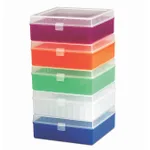
Thermo Fisher Scientific CD68 Monoclonal Antibody (KP1), eBioscience
✨AI 추천 연관 상품
AI가 분석한 이 상품과 연관된 추천 상품들을 확인해보세요
연관 상품을 찾고 있습니다...
Applications
Tested Dilution
Publications
Western Blot (WB)
Assay-Dependent
View 2 publications 2 publications
Immunohistochemistry (IHC)
-
View 23 publications 23 publications
Immunohistochemistry (Paraffin) (IHC (P))
1-5 µg/mL
View 4 publications 4 publications
Immunohistochemistry (PFA fixed) (IHC (PFA))
-
View 1 publication 1 publication
Immunohistochemistry (Frozen) (IHC (F))
1 µg/mL
View 1 publication 1 publication
Immunocytochemistry (ICC/IF)
5 µg/ml
View 9 publications 9 publications
Flow Cytometry (Flow)
Assay-Dependent
View 6 publications 6 publications
ELISA (ELISA)
-
View 1 publication 1 publication
Immunoprecipitation (IP)
Assay-Dependent
Mass Spectrometry (MS)
-
View 1 publication 1 publication
Product Specifications
Species Reactivity
Human
Published species
Human, Mouse, Non-human primate
Host/Isotype
Mouse / IgG1, kappa
Class
Monoclonal
Type
Antibody
Clone
KP1
Conjugate
Unconjugated Unconjugated Unconjugated
Form
Liquid
Concentration
0.5 mg/mL
Purification
Affinity chromatography
Storage buffer
PBS, pH 7.2
Contains
0.09% sodium azide
Storage conditions
4° C
Shipping conditions
Ambient (domestic); Wet ice (international)
RRID
AB_2864922
Product Specific Information
Description: The KP1 antibody reacts with human CD68 which belongs to the sialomucin family and is closely related to the family of lysosomal-associated membrane proteins (lamps) and scavenger receptor. CD68 is predominantly an intracellular protein, found mainly in the late endosomal compartment but can be detected in smaller amounts on the surface of mainly myeloid-derived cells; monocytes and macrophages, dendritic cells (and in some langerhan cells), neutrophils, basophils, mast cells, myeloid progenitor cells, and a subset of CD34+ hematopoietic bone marrow progenitor cells. The function has not been fully elucidated but based on homology and structure, CD68 may play a role in antigen processing or presentation and protection of the lysosomal membrane from hydrolytic enzymes. Reports have also shown expression in activated T cells, and about 40% of peripheral blood B-lymphocytes and 50% of all B-ALL. The KP1 antibody has also been reported to stain fibroblasts which may be due to a conserved epitope rather than fibroblasts expressing CD68.
Applications Reported: This KP1 antibody has been reported for use in flow cytometric analysis, immunoprecipitation, western blotting, immunohistochemical staining of frozen tissue sections, and immunohistochemical staining of formalin-fixed paraffin embedded tissue sections.
Applications Tested: This KP1 antibody has been tested by immunohistochemistry with both low and high pH antigen retrieval on FFPE tissue. Either antigen retrieval method can be used. This antibody can be used at less than or equal to 1 µg/mL. It is recommended that the antibody be carefully titrated for optimal performance in the assay of interest.
Purity: Greater than 90%, as determined by SDS-PAGE.
Aggregation: Less than 10%, as determined by HPLC.
Filtration: 0.2 µm post-manufacturing filtered.
Target Information
CD68 (Macrosialin) is a 110 kDa integral membrane glycoprotein predominantly expressed on the intracellular lysomsomes of monocytes and macrophages and to a lesser extent by dendritic cells and peripheral blood granulocytes. Also, CD68 could play a role in phagocytic activities of tissue macrophages, both in intracellular lysosomal metabolism and extracellular cell-cell and cell-pathogen interactions. CD68 is expressed by interdigitating reticulum cells in tonsil and some histiocytic lymphoma or histiocytosis, acute myeloid leukemia (AML), and granulocytic sarcoma. Elevated expression of CD68 has been demonstrated on CD34+ cells in various human malignancies, including several Acute Myeloid Leukemia studies.
For Research Use Only. Not for use in diagnostic procedures. Not for resale without express authorization.
🏷️Thermo Fisher Scientific 상품 둘러보기
동일 브랜드의 다른 상품들을 확인해보세요

Thermo Fisher Scientific
Thermo Fisher Scientific CD74 Monoclonal Antibody (VIC-Y1), eBioscience
465,300원

Thermo Fisher Scientific
Thermo Fisher Scientific 81-Place Polypropylene Cryo Storage Boxes
99,400원

Thermo Fisher Scientific
Thermo Fisher Scientific CD68 Monoclonal Antibody (KP1), eBioscience
143,700원

Thermo Fisher Scientific
Thermo Fisher Scientific CD69 Monoclonal Antibody (H1.2F3), eBioscience
202,400원

Thermo Fisher Scientific
Thermo Fisher Scientific CD69 Monoclonal Antibody (FN50), eBioscience
183,800원
배송/결제/교환/반품 안내
배송 정보
| 기본 배송비 |
| 교환/반품 배송비 |
|
|---|---|---|---|
| 착불 배송비 |
| ||
| 교환/반품 배송비 |
| ||
결제 및 환불 안내
| 결제수단 |
|
|---|---|
| 취소 |
|
| 반품 |
|
| 환급 |
|
교환 및 반품 접수
| 교환 및 반품 접수 기한 |
|
|---|---|
| 교환 및 반품 접수가 가능한 경우 |
|
| 교환 및 반품 접수가 불가능한 경우 |
|
교환 및 반품 신청
| 교환 절차 |
|
|---|---|
| 반품 절차 |
|
